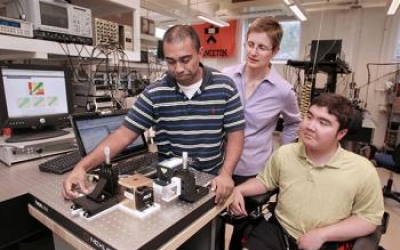- Latest news▼
-
12:36, May 3 Smoking during pregnancy may lead to obese children, study finds

-
10:29, May 3 Scientists discover cell responsible for repairing damaged liver tissue

-
20:17, May 2 NBR: low to moderate intensity exercise protects against depression

-
18:28, May 2 Sixth Armenian International Ophthalmological Conference will be held on 17-19 May

-
16:11, May 2 ВJN: High-fat foods may increase the risk of heart attack and stroke at a young age

-
14:16, May 2 Patterns: Neural network created that models outcome of various patient therapy methods

-
12:05, May 2 Armenia joins Council of Europe convention on protection of patients' rights

-
14:27, May 1 Journal of Neuroscience: Sluggishness of the elderly is due to greater use of calories, research finds

-
10:26, May 1 AstraZeneca admits its Covid vaccine can cause thrombosis

-
19:31, April 30 Scientists calculated how much time per day you should be sitting, standing and sleeping

-
17:37, April 30 The Conversation: Keeping bread in the fridge improves its health benefits

-
14:30, April 30 Frontiers in Molecular Biosciences: Researchers use AI to identify 191 new destructive viruses

-
08:38, April 30 The Guardian: First personalized cancer vaccine developed

-
23:55, April 29 Ketodiet improved the condition of patients with schizophrenia and bipolar disorder

-
19:47, April 29 In 64% of COVID-19 survivors, the condition worsens after one year

All materials
Blood sugar measured by laser may do away with pin pricks

Researchers are working on a way to use laser technology to measure blood glucose non-invasively. While there is still a way to go before they have a laser device that is portable and suitable for home use, they believe one day it will replace the need for diabetics to draw blood to test their glucose levels, Medical News Today reports.
In the journal Biomedical Optics Express, the team of electrical engineers, from Princeton University, NJ, describes how they used their prototype device to measure blood sugar by directing the laser at a person's palm.
Senior author Claire Gmachl, the Eugene Higgins Professor of Electrical Engineering at Princeton, says:
"With this work we hope to improve the lives of many diabetes sufferers who depend on frequent blood glucose monitoring."
Laser beam penetrates skin and is absorbed by glucose
The device works by sending a laser beam through skin cells - without causing damage - to be absorbed by sugar molecules.
The amount of absorption of the laser beam is thus an indicator of the amount of glucose in the blood.
Lead author Sabbir Liakat, a graduate student in electrical engineering, says even their early version of the laser system met this requirement, and the latest version is 84% accurate.
The challenge now is to improve the technology - and not least to bring down the scale.
The device uses a 'quantum cascade laser' to produce mid-infrared light
The quantum cascade laser allows the team to select the frequency they need in the mid-infrared region, and also because of recent improvements in the technology, it provides the increased power and stability needed to penetrate the skin.
Small study shows average readings meet required clinical accuracy
In their study paper they describe how they measured the blood sugar of three healthy volunteers before and after they each ate 20 jellybeans. The researchers also measured the resulting rise in blood sugar with the conventional finger-prick test.
The team repeated the experiment and took measurements several times over several weeks. The results showed that while the laser device's average readings had errors larger than standard blood sugar monitors, they were within the range required for clinical accuracy.
Follow NEWS.am Medicine on Facebook and Twitter
- Read also
- Event calendar
- Archive
- Most read
month
week
day
- 3 women diagnosed with HIV for first time after getting ‘beauty injections’ in US 1228
- The Guardian: First personalized cancer vaccine developed 1102
- In 64% of COVID-19 survivors, the condition worsens after one year 1075
- Scientists calculated how much time per day you should be sitting, standing and sleeping 1030
- AstraZeneca admits its Covid vaccine can cause thrombosis 1021
- The Conversation: Keeping bread in the fridge improves its health benefits 1020
- Ketodiet improved the condition of patients with schizophrenia and bipolar disorder 1005
- Frontiers in Molecular Biosciences: Researchers use AI to identify 191 new destructive viruses 994
- 362 cases of measles recorded in Armenia so far in 2024 927
- ECU: body tilt in patients after stroke was found to be curable 867
- Journal of Neuroscience: Sluggishness of the elderly is due to greater use of calories, research finds 849
- Blood: blood cancer drugs may be useful in rheumatoid arthritis 836
- Sixth Armenian International Ophthalmological Conference will be held on 17-19 May 748
- Armenia joins Council of Europe convention on protection of patients' rights 670
- NBR: low to moderate intensity exercise protects against depression 647
- Find us on Facebook
- Poll









